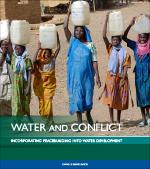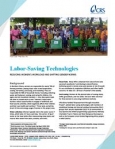Best Practices | July 15, 2009
Water and Conflict
Much of the world’s population lacks adequate clean water, either because of physical scarcity or because they are denied equitable access to water resources. Such conditions inevitably breed conflict. Water-related violence is common in many parts of the world and is generally expected to increase in the years ahead.
This document is intended to assist water development practitioners, civil society peacebuilders, and human rights advocates who are seeking to integrate water and peacebuilding in their work. The purpose is twofold: to furnish a conceptual framework for understanding problems of scarcity and equity, and to provide practical guidance and tools for action.
The text distills an extensive literature on water, conflict and cooperation produced in recent years by researchers and development practitioners. Case studies and reflections are included to keep the theory grounded in reality. The topics covered include:
- The global water situation
- Concepts of conflict, violence, conflict transformation and cooperation, as these relate to water
- Historical perspectives on water-related conflict and trends at the international and intranational levels
- Underlying causes of water-related conflict, broken down into socioeconomic, institutional/political, and environmental factors
- Peacebuilding principles for program design, rooted in Catholic social teaching, current views on the human right to water and international humanitarian law
- Ethical considerations related to water and peace
- Water development strategies, water-related conflict transformation tools and recommended steps for dealing with specific water-related conflict scenarios
CONTENTS
- Boxes, Figures and Tables
- Introduction
- 1. Water and Conflict
- 2. Principles for Water and Cooperation
- 3. Framing Water Development within a Peacebuilding Paradigm
- 4. Applying Peacebuilding and Conflict Transformation to Water and Sanitation Programming
- Appendix A: Summary of Lines of Inquiry for Evaluating the Risk of Water-Related Conflict
- Appendix B: Additional Resources Available Online
- Appendix C: References





